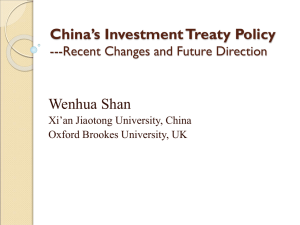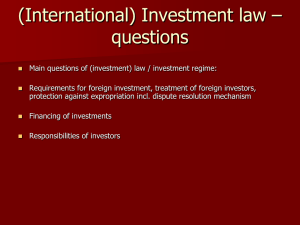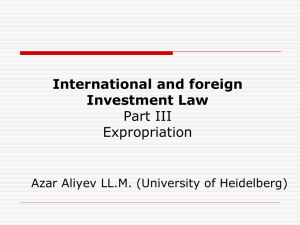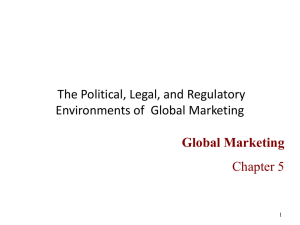Definition
advertisement
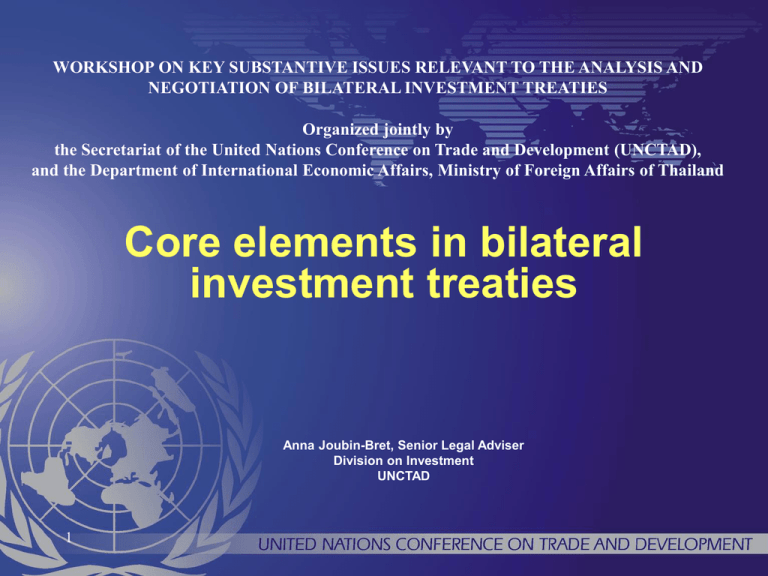
WORKSHOP ON KEY SUBSTANTIVE ISSUES RELEVANT TO THE ANALYSIS AND NEGOTIATION OF BILATERAL INVESTMENT TREATIES Organized jointly by the Secretariat of the United Nations Conference on Trade and Development (UNCTAD), and the Department of International Economic Affairs, Ministry of Foreign Affairs of Thailand Core elements in bilateral investment treaties Anna Joubin-Bret, Senior Legal Adviser Division on Investment UNCTAD 1 Objectives of the international legal framework Standards of treatment & protection Restrictions establishment • Ownership and control • Operational restrictions • Authorization and reporting Etc.. •Transparency •Treatment (NT, MFN.FET) •Nationalization & compensation (PEA) These objectives can be achieved through: • National policies 2 • Investment contracts/State contracts • International investment agreements (IIAs) •Transfer of funds BUILDING REDUCING .Entry and •Dispute settlement •Etc. Definitions • International investment agreements (IIAs). • Agreement: binding international instrument. • Treaty: binding international instrument involving States. • Instrument: all kinds of agreements, whether binding or non-binding. • Actors: Host State, Home State, Investor. 3 Hierarchy of norms • National laws and regulations – Investment codes. • State contracts, investment agreements, stabilization agreements. • Bilateral investment treaties for the promotion and protection of investment. • Regional agreements, Preferential trade and investment agreements. • Multilateral disciplines and specific agreements. 4 IIAs have several possible objectives Promotion Protection 5 Liberalization US-CAN-JAP BITS FTAs NAFTA A great number of IIAs cover more or less the same issues • Scope and definition of foreign investment; • Admission of investment or pre-establishment NT and MFN • Treatment of investment, i.e. National Treatment, MFN and FET; • Guarantees and compensation in respect of expropriation; • Transfer of funds and repatriation of capital and profits; • Operation conditions; and • Dispute settlement, both State-State and investor-State. …but the concrete way in which they are addressed differs substantially 6 1- DEFINITIONS 7 DEFINITIONS Definitions are key: What/who are we talking about? Who benefits from investment liberalization policies? Who is protected? Who is entitled to claim? 8 DEFINITIONS Definition of ‘investment’ Definition of ‘investor’ Link investment of an investor: ownership and control The laws and regulations of the host country Definition of ‘territory’ Other definitions 9 DEFINITION OF INVESTMENT Depending on the purpose of the treaty: Open-ended asset-based definition Enterprise-based Additional criteria Closed list and/or exceptions 10 DEFINITION OF INVESTMENT Open-ended asset-based definition : broad protection Illustrative list including usually: Movable and immovable property rights Various types of interest in companies Claims to money and claims under a contract having a financial value Intellectual Property Rights Business concessions and other contractual rights 11 DEFINITION OF INVESTMENT Thailand-Bulgaria BIT 1. The term “investments” shall mean every kind of assets Invested by the investors of one Contracting Party in the territory of the other Contracting Party in accordance with the respective laws and regulations of the latter Contracting Party, and shall include in particular though not exclusively: (a) movable and immovable property and any other property rights; (b) shares, stocks and debentures and any other forms of participation in companies; (c) claims to money or to any performance under any contracts having an economic value; (d) intellectual property rights, including in particular copyrights, patents, industrial design, trademarks and trade names, technical processes, know-how and goodwill; (e) business concessions conferred by law, under a contract, or an administrative act by competent State authorities to search for, cultivate, extract or exploit natural resources. 12 DEFINITION OF INVESTMENT Enterprise-based definition: targeted investment liberalization + protection 13 JAPAN-INDONESIA EPA ART: X02 ‘(a) the term “investments” means every kind of asset owned or controlled, directly or indirectly, by an investor, including: (i) an enterprise; (ii) shares, stocks or other forms of equity participation in an enterprise, including rights derived therefrom; (iii) bonds, debentures, loans and other forms of debt, including rights derived therefrom; (iv) rights under contracts, including turnkey, construction, management, production or revenue-sharing contracts; (v) claims to money and claims to any performance under contract having a financial value; (vi) intellectual property rights, including copyrights, patent rights and rights relating to utility models, trademarks, industrial designs, layout-designs of integrated circuits, new variety of plants, trade names, indications of source or geographical indications and undisclosed information; (vii) rights conferred pursuant to laws and regulations or contracts such as concessions, licenses, authorizations, and permits; and (viii) any other tangible and intangible, movable and immovable property, and any related property rights, such as leases, mortgages, liens and pledges; Note: Investments also include amounts yielded by investments, in particular, profit, interest, capital gains, dividends, royalties and fees. A change in the form in which assets are invested does not affect their character as investments. 14 DR-CAFTA : CRITERIA ‘investment means every asset that an investor owns or controls, directly or indirectly, that has the characteristics of an investment, including such characteristics as the commitment of capital or other resources, the expectation of gain or profit, or the assumption of risk. Forms that an investment may take include: (a) an enterprise; (b) shares, stock, and other forms of equity participation in an enterprise; (c) bonds, debentures, other debt instruments, and loans; (d) futures, options, and other derivatives; (e) turnkey, construction, management, production, concession, revenuesharing, and other similar contracts; (f) intellectual property rights; (g) licenses, authorizations, permits, and similar rights conferred pursuant to domestic law; and (h) other tangible or intangible, movable or immovable property, and related property rights, such as leases, mortgages, liens, and pledges. 15 DEFINITION OF INVESTMENT Key issues: Claims to money: will all claims to money be covered? Even those claims to money not related to FDI? What about payments derived from commercial transactions or from the sale of goods and services? Debt instruments: will all debt instruments be covered? What about those debt instruments with short-term maturity? Should there be a minimum maturity term specified? Intellectual property rights (IPRs): should a reference to a legal framework be included? Would only those IPRs provided in accordance to domestic legislation be considered an investment? Those IPRs existing pursuant international agreements? State Contracts: need for special treatment in definitions or substantive parts of the agreement. Exclusions: Public debt? Property acquired not for an economic activity (i.e. real estate)? Criteria: what about the Salini test? Contribution to development; Malaysian Historical Salvors 16 DEFINITION OF INVESTMENT New trend: the Closed-list: Canada-Peru Investment means: (I) an enterprise; (II) an equity security of an enterprise; (III) a debt security of an enterprise … but does not include a debt security, regardless of original maturity, of a state enterprise; (IV) a loan to an enterprise … but does not include a loan, regardless of original maturity, to a state enterprise; … but investment does not mean, (X) claims to money that arise solely from (i) commercial contracts for the sale of goods or services by a national or enterprise in the territory of a Party to an enterprise in the territory of the other Party, or (ii) the extension of credit in connection with a commercial transaction, such as trade financing, other than a loan covered by subparagraphs (IV) or ... (XI) any other claims to money, that do not involve the kinds of interests set out in subparagraphs (I) through (IX); 17 Recent Cases Issue: Scope of ICSID Convention art. 25 Investment is a necessary condition but not defined Double keyhole • Wording • Criteria 18 Should not be contradictory Definition of Investor Natural persons Juridical persons The link with investments: Owned and controlled Directly or indirectly 19 DEFINITION OF INVESTOR Natural Persons Criteria: Nationals/citizens of the Parties Protection for double nationals ? dominant and effective nationality criteria Permanent residents: Canadian approach Nationality criterion more often used than residence criterion. Sometimes combination: NZ/Singapore CEP Agreement. 20 Natural Persons - Example Thailand-Cambodia BIT For the purpose of this Agreement: 1. "investor" means: (a) any natural person possessing the citizenship or nationality in a Contracting Party in accordance with its law; or (b) any juridical persons which include corporation, partnership, trust, joint-venture, organization, association or enterprise incorporated or duly constituted in accordance with applicable laws of that Contracting Party, 21 Juridical Persons Criteria to determine the nationality of the legal entity/investor: country of organization or incorporation Country of the seat Combination of criteria The link with investment: ownership and control 22 Juridical Persons – Example 1 Traditional approach: definition of the investor Article 1: Definition (China-Germany BIT of 2003) The term "investor" means: (a) in respect of the Federal Republic of Germany: any juridical person as well as any commercial or other company or association with or without legal personality having its seat in the territory of the Federal Republic of Germany, irrespective of whether or not its activities are directed at profit; (…). (b) in respect of the People’s Republic of China: economic entities, including companies, corporations, associations, partnerships and other organizations, incorporated and constituted under the laws and regulations of and with their seats in the People’s Republic of China, irrespective of whether or not for profit and whether their liabilities are limited or not. 23 Juridical Persons Direct and indirect control: implications on dispute settlement Implications on shell companies, thirdParty investors,… On possible technical solution: Denial of benefits clause 24 Investor • Key issues in recent FTAs: • Pre-establishment disciplines • Definition of the potential investor: treaty coverage for an investor that has made or is in the process of making or is seeking to (or attempts to) make an investment. 25 2- ADMISSION AND ESTABLISHMENT 26 Admission Model Host country discretion: laws and regulations relating to entry may change. Ex: older Australian treaties: laws and regulations from time to time applicable Once admitted, foreign investment is granted treatment (NT, MFN) and protection No (or only few) exceptions to NT and MFN in the treaty: no need. 27 Entry of Foreign Investment Two approaches in IIAs: Admission model: entry in accordance with laws and regulations of the host country: NO LIBERALIZATION Pre-establishment model: right of establishment . National treatment at the preestablishment stage (Western Hemisphere, Japan, Korea): LIBERALIZATION : removal of barriers to access 28 Pre-Establishment NT and MFN NT and MFN at all stages of the investment, including at the pre-establishment stage: establishment, acquisition and expansion Lists of exceptions: all countries have closed sectors or non conforming measures. Mostly negative lists. Very few exceptions The right of establishment is granted in the Treaty, the national laws must be in conformity with Treaty obligations 29 Two issues for discussion In the light of recent cases and treaty practice of States: 30 • Admission in accordance with the laws and regulations of the host State the trigger of investment protection ? • What is the level of protection granted to “pre-investors” ? Admission in conformity with the laws and regulations Two preliminary questions: • Reference to the laws and regulations of the host country in several places in the treaty: definitions, admission, other provisions. • What are the laws and regulations of the host country: investment laws, formalities, general legal framework ? 31 Admission in conformity with the laws and regulations • Salini vs. Morocco: Definition “in accordance with the laws and regulations of the aforementioned party”. • Tribunal found that it is not a definitional issue but a validity issue. • “Seeks to prevent the Bilateral Treaty from protecting investments that should not be protected, particularly 32 Admission in conformity with the laws and regulations • Same approach in Tokios Tokeles vs. Ukraine: severity of deviations from national law. • In Bayindir vs. Pakistan: reference to host State laws refers to legality and since it did not violate Pakistani laws and regulations: tribunal had jurisdiction. 33 Admission in conformity with laws and regulations • Aguas del Tunari vs. Bolivia: included in the admission clause: “Subject to its right to exercise powers conferred by its laws and regulations, each Party shall admit such investment”. • Tribunal interprets reference to the “framework of its laws and regulations” as a reference “limited to the details of how each contracting party undertakes in its national laws and regulations to promote economic cooperation through the 34 protection of investments”. Admission in conformity with the laws and regulations • Fraport vs. Philippines: Violation of the Anti Dummy Law (secret shareholders agreement). • Tribunal found a violation of the ADL. Found that a failure to comply with the national law to which a treaty refers will have an international legal effect. • Subjective assessment: good faith or intentional violation. • No jurisdiction. Jurisdictional matter vs. Issue belonging to the merits (Cremades dissenting 35 opinion). Admission in conformity with the laws and regulations • Inceysa V. Republic of El Salvador (6August 2006, ICSID ARB/0326) • Inceysa argued that denial of exclusivity was an expropriation of its rights under the contract and violated El Salvador-Spain BIT • Tribunal found that Inceysa had made false representations to secure the contract • Thus the investment violated the laws of El Salvador and could not be arbitrated pursuant to the BIT. • CONTRAST: Ioannis Kardassopoulos v. Georgia (6 July 2007, ICSID Case No. ARB/05/18) • Where it was the host state’s own actions that may have rendered the agreement illegal, the investment does not lose protection under the BIT. 36 Violation of the Right of Establishment • Not necessary to have an investment: • ICSID: No • Often: Yes. 37 Recent cases: conclusions? • Admission by the host State in accordance with its laws and regulations deserves further attention. Not a definitional issue but a validity issue. • Analysis in relation to the purpose of a BIT: not meant to protect unlawful investments • Not many cases addressing pre-establishment rights • Tribunals reluctant to consider pre-establishment expenditures as an ‘investment’ under the ICSID 38 Convention 3- National Treatment and Most Favoured Nation Treatment 39 NT and MFN Relative standards National treatment: grant foreign investors, in like circumstances, treatment no less favourable than the treatment of nationals. Most-favoured-nation treatment: no discrimination among foreign investors on the basis of nationality. 40 National Treatment The application “de jure” and “de facto” of the standard Most agreements do not specifically limit the scope of the national treatment standard only to a “de jure” test. Thus, jurisprudence has found that the standard applies both to “de jure” and “de facto” discrimination. Approach may have a positive effect in fostering discipline in the domestic application of legislation However, it is important to examine administrative practice and existing legislation that may have a “de facto” discriminatory impact on foreign investment. 41 National Treatment Treatment “in like circumstances” Comparison requires a comparator. Methanex case. Best “in state treatment” When negotiating with countries having federal systems of government, a situation may arise when one sub national unit discriminates among other sub national units from the same country. Important to ensure that the National Treatment standard applies with respect to a regional level of government, treatment no less favourable than the most favorable treatment accorded, in like circumstances, by that regional level of government to investments or investors of the Party from which it forms a part. 42 National Treatment Key issues: Establishing the relevant basis for comparison: Methanex. Determining whether any differential treatment results from, or is connected to, the nationality of the investor. 43 National Treatment Exceptions and reservations to national treatment General exceptions based on reasons of public health, order and morals, and national security. Such exceptions are present in most regional and multilateral investment agreements, and also in a number of FTAs. Subject-specific exceptions which exempt specific issues from national treatment, such as intellectual property, taxation provisions in bilateral tax treaties, prudential measures in financial services or temporary macroeconomic safeguards. Country-specific exceptions whereby a contracting party reserves the right to differentiate between domestic and foreign investors under its laws and regulations – in particular, those related to specific industries or activities – for reasons of national economic and social policy. Country-specific exceptions may overlap with subject-specific exceptions. 44 MFN Treatment • Seemingly clear concept/relation to trade • Very different approaches in treaties and in cases wording is key • Three key elements: • Scope of the MFN standard: the investor/his investment/ the life cycle of the investment/ in all matters relating to…. • The substantive content of MFN: treatment no less favourable. The qualifier: in like circumstances • Exceptions to MFN: General exceptions, REIO exceptions, taxation and DTT. 45 MFN – Relevant cases MFN clause invoked to import substantive obligations: • Ambatielos Claim (Greece v. U.K), 1956. • MTD Equity Sdn.Bhd. et al. v. Republic of Chile, ICSID ARB/01/7, Award 25 May 2004. • ADF Group Inc. v. United States of America, ICSID ARB/00/1, Award 9 January 2003. • CMS Gas Transmission Company v. the Argentine Republic, ICSID ARB/01/8, Award 25 April 2005. 46 MFN – Relevant cases MFN clause invoked to import dispute settlement mechanism • Maffezzini v. Kingdom of Spain, ICSID ARB/97/7. Decision on jurisdiction, 25 January 2000. • Siemens A.G. v. the Argentine Republic, ICSID ARB/02/8, Decision on Jurisdiction 3 August 2004. • Plama Consortium Ltd. et. al. v. Republic of Bulgaria, ICSID ARB/03/24, Decision on jurisdiction 8 February 2005. • Salini Costruttori S.p.A v. The Hashemite Kingdom of Jordan, ICSID ARB/02/13, Decision on jurisdiction 29 November 2004. 47 MFN Treatment • • • • Jurisprudence: The ejusdem generis principle Public policy considerations as fundamental conditions. Plama and Salini: • distinction must be drawn between substantive and jurisdictional provisions of treaties in order to identify the scope of protection offered by an MFN provision • importance of the wording of the basic treaty. 48 4- Expropriation 49 What does expropriation mean? • Direct: Transfer of title or outright seizure • Indirect: Total or substantial deprivation of the substantial rights associated to an investment, without actual formal transfer or seizure, having equivalent effects to a direct expropriation • Regulatory taking: a separate category? • Classic formulation in an IIA: Neither Contracting Party may expropriate or nationalize an investment either directly or indirectly through measures tantamount to expropriation or nationalization (“expropriation”), except... 50 Expropriation under customary international law • It is lawful to expropriate any asset or industry. Sovereign right. • But it is unlawful to do it arbitrarily • 4 requirements: 1. For a public purpose, 2. On a non discriminatory basis, 3. In accordance with due process of law, and 4. Against payment of compensation (prompt, adequate and effective) 51 Expropriation Possible standards of compensation: • The Hull formula • Appropriate compensation • Different valuation methods: book-value method, discounted cash-flow method,… Expropriation and Regulatory Takings: Necessary clarification of the obligation • General exception: public health and safety. • The right to regulate for public purpose. 52 Protection against expropriation Thailand-Croatia BIT 1. A Contracting Party shall not expropriate or nationalise directly or indirectly an investment in its territory of an investor of another Contracting Party or take any measure or measures having equivalent effect (hereinafter referred to as "expropriation") except: a) for a purpose which is in the public interest, b) on a non-discriminatory basis, c) in accordance with due process of law, and d) accompanied by payment of prompt, adequate and effective compensation. 2. Compensation shall be paid without delay. 3. Such compensation shall amount to the fair market value of the expropriated investment at the time immediately before the expropriation was taken or became publicly known, whichever is earlier. 4. The payment of such compensation shall be freely transferable in a freely usable currency on the basis of the market rate of exchange existing for that currency at the moment referred to in paragraph 2 of this Article. Compensation shall also include interest at a commercial rate established on a market basis for the currency in question from the date when the payment is due until the date of actual payment. 5. The investor, whose investments are expropriated, shall have the right to prompt review of its case by a judicial or other competent authority of that Contracting Party, valuation of its investments and payment of compensation in accordance with the principles set out in this 53 Article. What rights can be expropriated? • Property rights • Contractual Rights? • Intangibles that are not property rights? (e.g. “goodwill” or “market share”) • Economic expectations, loss of profit? 54 Indirect Expropriation “A deprivation or taking of property may occur under international law through interference by a state in the use of that property or with the enjoyment of its benefits, even where legal title to the property is not affected.” TIPPETTS “… it is recognized in international law that measures taken by a State can interfere with property rights to such an extent that these rights are rendered so useless that they must be deemed to have been expropriated, even though the State does not purport to have expropriated them and the legal title to the property formally remains with the original owner.” STARRET HOUSING 55 Indirect Expropriation • There are no specific rules to determine whether a measure constitutes an indirect expropriation • Requires a case by case analysis • However, some basic principles have to be examined 56 Indirect Expropriation Factor 1: Determining the economic impact of the measure • Deprivation shall be total or at least substantial • A mere interference or a partial negative effect does not constitute an indirect expropriation • Duration of the measure • Rejecting explicitly the "sole effects"doctrine 57 SD Myers v. Canada “In this case, the Interim Order and the Final Order were designed to, and did, curb SDM’s initiative, but only for a time. Canada realized no benefit from the measure. The evidence does not support a transfer of property or benefit directly to others. An opportunity was delayed. The Tribunal concludes that this is not an expropriation case” Roy Feldman v. Mexico “... the regulatory action has not deprived the Claimant of control of his company, . . . interfered directly in the internal operations... or displaced the Claimant as the controlling shareholder” 58 Pope & Talbot v. Canada “…the test is whether that interference is sufficiently restrictive to support a conclusion that the property has been “taken” from the owner…mere interference is not expropriation; rather, a significant degree of deprivation of fundamental rights of ownership is required” CME v. Czech Republic “…the Media Council’s actions and omissions…caused the destruction of the [joint-venture’s] operations, leaving the [joint venture] as a company with assets, but without business”. 59 Indirect Expropriation Factor 2: Interference with investor's expectations • Legitimate expectations need not to be based on specific and explicit undertakings or representations of the host State Azurix v. Argentina • Legitimate expectations require “specific commitments given by the regulating government to the then putative foreign investor Methanex v. USA 60 Indirect Expropriation Factor 3: Analysis of the nature, the purpose and character of the measure • Do the “purpose” and “nature” of the measure matter? • NOT necessarily • Finally, the “public purpose” is one of 4 requirements 61 Phelps Dodge (Iran-USA) “The Tribunal fully understands the reasons why the respondent felt compelled to protect its interests through this transfer of management, and the Tribunal understands the financial, economic and social concerns that inspired the law pursuant to which it acted, but those reasons and concerns cannot relieve the Respondent of the obligation to compensate Phelps Dodge for its loss” Santa Elena v. Costa Rica “While an expropriation or taking for environmental reasons may be classified as a taking for a public purpose, and thus be legitimate, the fact that the property was taken for this reason does not affect either the nature or the measure of the compensation to be paid for the taking” “Expropriatory environmental measures – no matter how laudable and beneficial to society as a whole – are, in this respect, similar to any other expropriatory measures that a state may take in order to implement its policies: where property is expropriated, even for environmental purposes, whether domestic or international, the state’s obligation to pay compensation remains” 62 Regulatory Taking - Asserting the State's right to regulate in the public interest However, the “purpose” and “nature” are part of the relevant analysis in order to establish a valid regulatory act not subject to compensation (“police power exception”), an issue widely accepted under customary international law “…state measures, prima facie a lawful exercise of powers of governments, may affect foreign interests considerably without amounting to expropriation” Ian Brownlie, Principles of Public International Law 63 Tecmed v. Mexico “The principle that the State’s exercise of its sovereign power within the framework of its police power may cause economic damage to those subject to its powers as administrator without entitling them to any compensation whatsoever is undisputable” Feldman v. Mexico “...not all government regulatory activity that makes it difficult or impossible for an investor to carry out a particular business, change in the law or change in the application of existing laws that makes it uneconomical to continue a particular business, is an expropriation....” Methanex v. USA “As a matter of general international law, a non-discriminatory regulation for a public purpose, which is enacted in accordance with due process and, which affects, inter alias, a foreign investor or investment is not deemed expropriatory and 64 compensable…” Indirect Expropriation USA BIT Model 2004, Annex B The Parties confirm their shared understanding that: 1. Article [Expropriation and Compensation] is intended to reflect customary international law concerning the obligation of States with respect to expropriation. 2. An action or a series of actions by a Party cannot constitute an expropriation unless it interferes with a tangible or intangible property right or property interest in an investment. 3. Article 6 [Expropriation and Compensation](1) addresses two situations. The first is direct expropriation, where an investment is nationalized or otherwise directly expropriated through formal transfer of title or outright seizure. 4. The second situation addressed by Article 6 [Expropriation and Compensation](1) is indirect expropriation, where an action or series of actions by a Party has an effect equivalent to direct expropriation without formal transfer of title or outright seizure. 65 Indirect Expropriation USA BIT Model 2004, Annex B (Cont.) 4. (a) The determination of whether an action or series of actions by a Party, in a specific fact situation, constitutes an indirect expropriation, requires a case-by-case, factbased inquiry that considers, among other factors: (i) the economic impact of the government action, although the fact that an action or series of actions by a Party has an adverse effect on the economic value of an investment, standing alone, does not establish that an indirect expropriation has occurred; (ii) the extent to which the government action interferes with distinct, reasonable investment-backed expectations; and (iii) the character of the government action. (b) Except in rare circumstances, non-discriminatory regulatory actions by a Party that are designed and applied to protect legitimate public welfare objectives, such as public health, safety, and the environment, do not constitute indirect expropriations. 66 5- Transfer of Funds 67 Transfer of Funds Two types of transfers: inward and outward. Exceptions BOP safeguards: temporary derogations Transitional provisions: maintaining existing restrictions. 68 Transfer of Funds Thailand-Finland BIT 1) Each Contracting Party shall, subject to its laws and regulations allow without delay the transfer in any freely convertible currency: a) the capital of and returns from investments of the nationals or companies of the other Contracting Party; b) the proceeds from the total or partial liquidation or sale of investments made by nationals or companies of the other Contracting Party; c) funds in repayment of loans given by nationals or companies of one Contracting Party to the nationals or companies of the other Contracting Party which both Contracting Parties have recognized as investments; d) the earnings of nationals of the other Contracting Party who are employed and allowed to work in connection with investments in its territory. 2) Each Contracting Party shall, subject to its laws and regulations, also allow free transfer from its territory of movable property constituting part of investments by nationals or companies of the other Contracting Party. 3) The Contracting Parties undertake to accord to transfers referred to in paragraphs 1) and 2) of this Article a treatment no less favourable than that accorded to transfers originating from investments made by nationals or companies of any third State. 69 Transfer of Funds Exceptions Concerns: • • An investor may seek to transfer a large sum at a time when foreign exchange reserves are low, depleting exchange reserves. Massive capital flight during times of economic difficulty. Main economic derogation provisions: • • 70 “Temporary economic derogation”: a host country can impose new restrictions on a temporary basis for reasons relating to BOP and macroeconomic management. “Transitional provisions”: the host country can maintain existing restrictions that would otherwise not be permitted, on the grounds that the economy is not yet in a position to eliminate these restrictions. Transfer of Funds Exceptions BIT Australia – Mexico, 2005 Article 9, Transfers (...) 3. Notwithstanding paragraphs 1 and 2 above, a Contracting Party may prevent a transfer through the equitable, non-discriminatory and in good faith application of its laws relating to: (a) bankruptcy, insolvency or the protection of the rights of creditors; (b) issuing, trading or dealing in securities; (c) criminal offences; or (d) ensuring the satisfaction of judgements in adjudicatory proceedings. 4. In case of serious balance of payments difficulties or the threat thereof, each Contracting Party may temporarily restrict transfers provided that such a Contracting Party implements measures or a programme in accordance with international standards. These restrictions shall be imposed on an equitable, non-discriminatory and in good faith basis. 71 6- General Treaty Exceptions 72 General Exceptions • Balance between investment protection and the safeguarding of values considered to be fundamental by the countries concerned. • Exempts from compliance with treaty obligations in situations where this would be incompatible with key policy objectives: • • • • • • 73 Taxation. Essential security and public order. Protection of health and natural resources. Cultural exceptions (Canada, France, 2007 Norway model BIT). Prudential measures for financial services. Miscellaneous exceptions (e.g., excluding certain geographical area from the application of the agreement). 7- Investor-State Dispute Settlement 74 1. Consultation and negotiation • Limit the scope of the dispute: "disputes arising from the application and interpretation of the Agreement". The dispute settlement mechanism should not apply to any kind of dispute (e.g. a conflict regarding the interpretation or application of a domestic law should not be settled by this mechanism). • Consultation and negotiation. Efficient mechanisms for ADR, credibility, consistency with treaty obligations, enforceability. • Timing: Starting date and ending date for the cooling-off period. • The disputing party shall submit a written request for consultation or negotiation with a view to settle the dispute amicably. 75 2. Scope of the claim • Define who can submit a claim (a national and an enterprise) • Claim brought by the investor. • Claim brought by the investment. • Define the scope of the claim (a breach of an obligation under the agreement and existence of loss or damage linked to the breach). • Not any dispute, not any matter in relation with an investment. 76 3. Submission of a claim to arbitration If the dispute cannot be settled through consultation and negotiation within the cooling-off period, the disputing party or either party may submit a claim either: (a) to the competent court of the State in whose territory the investment has been made; (b) to national arbitration; (c) to international arbitration: - - under the International Centre for the Settlement of Investment Disputes (ICSID) Convention, provided that both Parties are parties to the ICSID Convention; under the ICSID Additional Facility Rules, provided that either the nondisputing Party or the respondent, but not both, is a party to the ICSID Convention; under the UNCITRAL Arbitration Rules; or under any other arbitration institution or under any other arbitration rules, if the disputing parties agree. 77 3. Submission of a claim to arbitration (Cont.) • To avoid the multiplicity of forum in which an investor could settle a dispute, it is useful to introduce a provision on the definite choice of the investor: the investor chooses to go either to local court or to arbitration. • Once this choice has been made, there is no possibility to use the other mechanism to settle the dispute ("fork in the road" provision). • Example: If an investor elects to submit a claim to a court or administrative tribunal of the party in whose territory the investment has been made, that election shall be definitive and the investor may not thereafter submit the claim to arbitration. • The consent of each party to arbitration should be given. 78 3. Submission of a claim to arbitration (Cont.) • Limitations: it could be relevant to mention that a claim should not be submitted to arbitration after a certain period of time. Example: No claim may be submitted to arbitration if more than three years have elapsed from the date on which the disputing party first acquired, or should have first acquired, knowledge of the breach and knowledge that the natural or juridical person has incurred loss or damage. 79 4. Selection of arbitrators / Constitution of a tribunal Certainty and predictability in the procedure: It is common to define how the arbitral tribunal should be constituted and the arbitrators appointed: • Unless the disputing parties otherwise agree, the Tribunal shall comprise 3 arbitrators, one arbitrator appointed by each of the disputing parties and the third, who shall be the presiding arbitrator, appointed by agreement of the disputing parties. • Appointing authority for an arbitration. In case the arbitral tribunal has not been constituted within a certain period (3 months?) from the date on which a claim was submitted to arbitration, the President of the International Court of Justice, on the request of either disputing party, shall appoint, in his/her discretion, the arbitrator or arbitrators not yet appointed. The SecretaryGeneral of ICSID can also play this role. • Issue of nationality of the arbitrators. • To facilitate the appointment of arbitrators, it could also be recommended to maintain a roster of arbitrators experienced in international law and investment matters. 80 5. Interim measures of protection • During the time of the arbitration, it might be relevant to apply measures of protection. • Example: A Tribunal may order an interim measure of protection to preserve the rights of a disputing party, or to facilitate the conduct of arbitral proceedings, including an order to preserve evidence in the possession or control of a disputing party. 81 6. Governing law • For a state-of-the-art agreement, it is important to include a provision on the governing law for arbitration. Indeed, a Tribunal shall decide the issues in dispute in accordance with the Agreement, the national laws of the host State of the investment and applicable rules of international law. • Role of the Sub-Committee on investment to interpret a provision of the treaty. Interpretation binding on the arbitral tribunal? 82 7. Final award Provisions on the final award are quite standard: • Where a tribunal makes a final award against a party, the tribunal may award, separately or in combination, only: (a) monetary damages and any applicable interest; (b) restitution of property, in which case the award shall provide that the party may pay monetary damages and any applicable interest in lieu of restitution; (c) where a claim is submitted to arbitration by a juridical person, an award of monetary damages and any applicable interest shall provide that the sum be paid to the enterprise. • A tribunal may also award costs and attorneys’ fees in accordance with this Agreement and the applicable arbitration rules. • A tribunal may not award punitive damages. 83 8. Finality and enforcement of an award It is relevant to have an article on the enforcement of the award: • An award made by a tribunal shall be final, and binding on the disputing parties in respect of the particular case. • Subject to the applicable revision, annulment or set aside procedures, a disputing party shall abide by and comply with an award without delay. • Each Party shall provide for the enforcement of an award in its territory. • If a disputing Party fails to abide by or comply with a final award, the Party whose investor was a party to the arbitration may have recourse to the dispute settlement procedure between Member States. In this event, the requesting Party may seek: (a) a determination that the failure to abide by or comply with the final award is inconsistent with the obligations of this Agreement; and (b) a recommendation that the Party abide by or comply with the final award. 84



